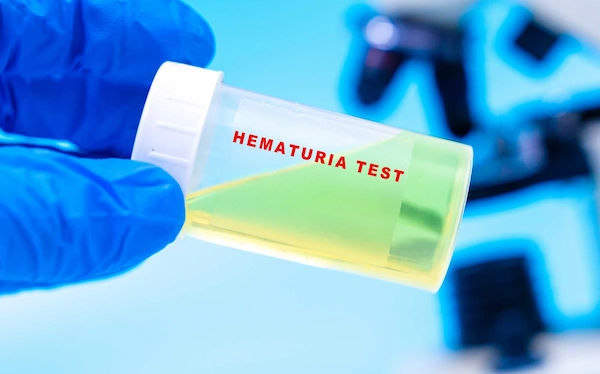Blood in Urine; 12 Potential Causes and What to Do Next
Discover 12 possible causes of blood in urine (haematuria), from common infections to serious conditions. Learn diagnosis methods, treatments, and when to seek urgent care.


Introduction
Noticing a pink, red, or brownish tint to your urine can be a shocking and anxiety-inducing experience. Medically known as haematuria, the presence of blood in urine is a significant symptom that demands attention. While it's natural to fear the worst, it's crucial to understand that this condition has a wide range of potential causes, from a simple infection to more complex issues. This article will demystify haematuria, exploring its common and serious causes, explaining how it's diagnosed, and guiding you on the critical next steps. Your health is paramount, and understanding this symptom is the first move toward addressing it effectively. Remember, this information empowers you to have an informed conversation with a healthcare professional, who can provide a precise diagnosis and tailored treatment plan.
What is Haematuria? Understanding the Two Main Types
Haematuria is simply the medical term for red blood cells present in urine. It's important to know that not all discoloured urine is due to blood, but when it is, it's categorised into two main types.
Gross Haematuria: When You Can See the Blood
This is what most people think of—urine that is visibly pink, red, or cola-coloured. Sometimes, you might even see small blood clots. The amount of blood doesn't necessarily correlate with the seriousness of the condition; even a small amount can cause a visible colour change.
Microscopic Haematuria: The Hidden Blood You Can't See
This type is far more common and is only detectable under a microscope during a urine test. You won't notice any change in your urine's colour. It's often discovered incidentally during a routine medical check-up or while being tested for another condition.
Common and Often Benign Causes of Blood in Urine
Many cases of haematuria, especially microscopic, are linked to temporary and treatable issues.
Urinary Tract Infections (UTIs): A Frequent Culprit
When bacteria enter your body through the urethra and multiply in your bladder, they can cause a UTI. This infection leads to inflammation and irritation of the bladder lining (cystitis), causing bleeding. Symptoms of a UTI often include a persistent urge to urinate, pain and burning with urination, and strong-smelling urine. This is one of the most common causes of blood in urine, especially in women.
Kidney Stones: The Agonising Cause
Minerals in your urine can sometimes crystallise, forming hard stones in your kidneys or bladder. When these stones pass through or cause a blockage, they can scratch the lining of the urinary tract, leading to significant bleeding and often severe pain. The kidney stone pain location is typically in the back or lower abdomen and can be excruciating.
Vigorous Exercise and Strenuous Activity
Though less common, strenuous exercise—particularly long-distance running—can cause gross haematuria. The exact cause isn't always clear but may be linked to dehydration, the breakdown of red blood cells, or trauma to the bladder. This usually resolves on its own with rest and hydration within 24-72 hours.
An Enlarged Prostate (BPH) in Men
As men age, the prostate gland often enlarges in a condition known as benign prostatic hyperplasia (BPH). This gland surrounds the urethra, and as it grows, it can compress the tube, making it difficult to urinate and potentially causing blood to appear in the urine. It's a very common cause in men over 50.
More Serious Underlying Conditions
In some cases, haematuria can be a warning sign of a more significant health issue that requires prompt medical intervention. Consult a Urologist for the best advice
Kidney Disease and Glomerulonephritis
Glomerulonephritis is inflammation of the tiny filters in your kidneys (glomeruli). This can occur on its own or as part of another disease, like diabetes or lupus. It impairs the kidney's filtering ability, allowing blood to leak into the urine. This is a primary cause of microscopic haematuria.
Cancers of the Urinary Tract: Bladder, Kidney, or Prostate
Is painless haematuria serious? Yes. Visible, painless bleeding can sometimes be the first sign of advanced cancers in the urinary system, such as bladder cancer, kidney cancer, or prostate cancer. This is why it is absolutely critical to see a doctor for any episode of gross haematuria, even if it's painless and goes away on its own.
Inherited Disorders like Sickle Cell Anaemia
Inherited conditions like sickle cell anaemia—a genetic defect of haemoglobin that causes red blood cells to become misshapen—can cause haematuria. These defective cells can block blood flow in the kidneys, leading to blood in the urine.
Medications and Foods That Can Change Urine Colour
Is It Really Blood? Pigments from Food and Drugs
Sometimes, what looks like blood in urine is actually just a harmless change in colour caused by certain foods or medicines. Beetroots, blackberries, and rhubarb can turn urine red or pink. Certain drugs, like the antibiotic rifampicin or the pain reliever phenazopyridine, can also cause orange or red urine. A simple urinalysis can quickly distinguish between blood and these benign pigments.
How is the Cause of Haematuria Diagnosed?
If you report blood in urine, your doctor will follow a systematic approach to find the root cause.
The Crucial Role of Urinalysis and Urine Culture
A urinalysis is the first and most important test. It confirms the presence of red and white blood cells, checks for infection-causing bacteria, and looks for high levels of protein or minerals that form stones. If an infection is suspected, a urine culture is done to identify the specific bacteria and determine the most effective antibiotic.
Imaging Tests: CT Scans, Ultrasounds, and MRIs
Imaging tests provide a detailed view of your kidneys, bladder, and ureters. A CT scan is excellent for detecting even small kidney stones and tumours. An ultrasound is a non-invasive alternative that uses sound waves to create images and is often used as a first-line imaging tool.
Cystoscopy: A Closer Look Inside the Bladder
In this procedure, a urologist inserts a thin, flexible tube with a camera (cystoscope) through your urethra to see the inside of your bladder and urethra. This is a key procedure for how to diagnose bladder cancer and check for other abnormalities like ulcers or polyps.
Treatment: Addressing the Root Cause
There is no single treatment for haematuria; it entirely depends on the underlying cause.
• UTIs are treated with a course of antibiotics.
• Kidney stones may require pain management, increased fluid intake, or procedures to break up or remove larger stones.
• Enlarged prostate can be managed with medication or surgery.
• Cancers require specialised treatment plans, which may include surgery, chemotherapy, or radiation.
• Kidney disease requires managing the underlying condition, often with medication and lifestyle changes.
If your condition does not improve after trying initial methods, or if you receive a complex diagnosis, booking a physical visit to a specialist with Apollo24|7 can provide the focused care you need.
When to Seek Immediate Medical Attention: Red Flags
Seek emergency care if blood in urine is accompanied by:
• An inability to urinate.
• Severe pain in your back, side, or abdomen.
• Nausea, vomiting, fever, or chills.
• Passing large blood clots in your urine.
• Dizziness, lightheadedness, or fainting (signs of significant blood loss).
Conclusion
Discovering blood in urine is undoubtedly alarming, but knowledge is your greatest asset. Understanding the spectrum of potential causes—from temporary infections to conditions requiring specialised care—allows you to approach the situation with clarity rather than fear. The universal takeaway is the non-negotiable importance of consulting a healthcare professional. They possess the tools, from urinalysis to advanced imaging, to provide a definitive diagnosis and guide you toward effective treatment. Your proactive step in seeking answers is the first and most critical move toward safeguarding your long-term health. If symptoms persist beyond a day or two, consult a doctor online with Apollo24|7 for a preliminary evaluation and to determine if further testing is needed. Consult a Urologist for the best advice
Consult a Urologist for the best advice

Dr Anupam Sharma
Urologist
18 Years • MBBS, MS(Gen Surgery), DNB (Urology)
Delhi
Apollo Hospitals Indraprastha, Delhi
(25+ Patients)

Dr. Amvrin Chatterjee
Urologist
10 Years • MBBS, MS, DNB, MCh
Kolkata
Apollo Multispeciality Hospitals , Kolkata, Kolkata
Dr. Mohamad Ali
Urologist
1 Years • MBBS, MS General Surgery, M Ch Urology
Pune
Apollo Hospitals Pune, Pune

Dr. Shashikant Gupta
Urologist
13 Years • MS (General Surgery),MCh (Urology & Renal Transplant)
Lucknow
Apollomedics Super Speciality Hospital, Lucknow
(50+ Patients)

Dr. S Suresh Goud
Urologist
4 Years • MS, Mch (Uro)
Karimnagar
Apollo Reach Hospitals Railway Station Road, Karimnagar
(25+ Patients)
Consult a Urologist for the best advice

Dr Anupam Sharma
Urologist
18 Years • MBBS, MS(Gen Surgery), DNB (Urology)
Delhi
Apollo Hospitals Indraprastha, Delhi
(25+ Patients)

Dr. Amvrin Chatterjee
Urologist
10 Years • MBBS, MS, DNB, MCh
Kolkata
Apollo Multispeciality Hospitals , Kolkata, Kolkata
Dr. Mohamad Ali
Urologist
1 Years • MBBS, MS General Surgery, M Ch Urology
Pune
Apollo Hospitals Pune, Pune

Dr. Shashikant Gupta
Urologist
13 Years • MS (General Surgery),MCh (Urology & Renal Transplant)
Lucknow
Apollomedics Super Speciality Hospital, Lucknow
(50+ Patients)

Dr. S Suresh Goud
Urologist
4 Years • MS, Mch (Uro)
Karimnagar
Apollo Reach Hospitals Railway Station Road, Karimnagar
(25+ Patients)
More articles from Blood In Urine
Frequently Asked Questions
1. Can dehydration cause blood in urine?
Yes, severe dehydration can concentrate the urine and, in some cases, cause irritation and microscopic bleeding. However, it's more commonly associated with changing urine colour to a dark amber, which can be mistaken for blood. It's essential to rule out other causes with a doctor.
2. Should I go to the ER for blood in my urine?
You should go to the ER if the bleeding is heavy, you are passing large clots, you cannot urinate, or you have severe pain, fever, chills, nausea, or dizziness. These are signs of a potentially critical situation.
3. What does a small amount of blood in urine mean?
Even a small amount can be significant. It could indicate a minor issue like a small kidney stone or the very beginning of a UTI. However, it could also be the only sign of a more serious condition like early-stage bladder cancer. Always get it checked.
4. Can stress cause haematuria?
Stress itself is not a direct cause of blood in urine. However, high stress can weaken your immune system, making you more susceptible to UTIs, which are a common cause. The link is indirect.
5. What kind of doctor should I see for blood in urine?
You can start with your primary care physician or a general practitioner. They will likely order initial tests. Depending on the results, they may refer you to a urologist (for issues involving the urinary tract) or a nephrologist (for kidney-related diseases).

